You have many options when you want to make changes to your smile. Dental veneers are a common way to transform your teeth in one quick treatment. We use veneers to treat crooked teeth, stained teeth, or other cosmetic dentistry concerns. We offer porcelain veneers in Philadelphia, PA, to give you a whiter and more beautiful smile.
Our dental care team uses dental veneers for subtle changes and dramatic transformations. Dr. Derek Conover may suggest porcelain or composite resin veneers based on your specific needs and goals. This cosmetic treatment covers the front surface of a tooth and gives you a whole new smile.
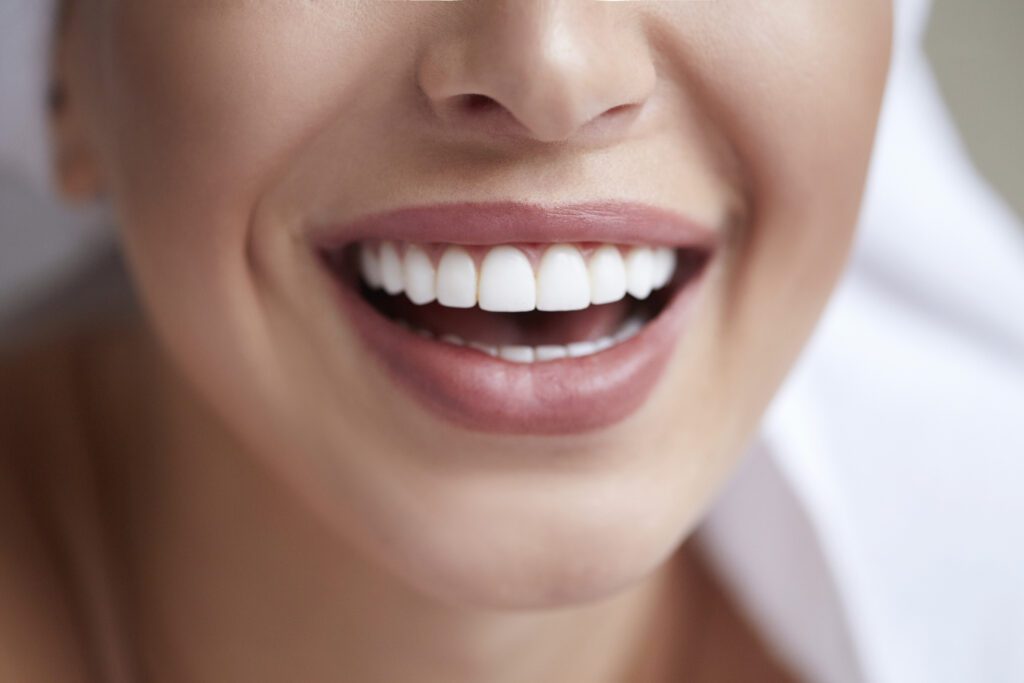
What Can Veneers Treat?
Our dental care team will meet with you to evaluate your smile and discuss your cosmetic goals. We can create a personalized treatment plan to meet your needs. Your dentist will recommend the most suitable treatment to ensure the best possible result.
Your dentist can use dental veneers to treat cosmetic dental imperfections, such as:
- Close spaces between teeth
- Treat black triangles
- Improve the look of crooked teeth
- Repair cracked, broken, or chipped teeth
- Cover stained or discolored teeth
We often recommend veneers as an alternative to teeth whitening or braces treatment. While we recommend braces for patients with severely crooked teeth, veneers can cover slightly crooked teeth and deep tooth stains. They offer a smooth and seamless look.
Which Type of Dental Veneers Are Right For You?
Several types of dental veneers are available. Our cosmetic dentistry office will suggest the best option for your needs and goals. We will consider your specific cosmetic goals and budget before treatment.
Composite Resin Veneers
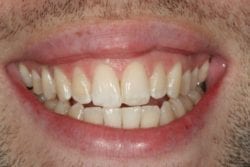
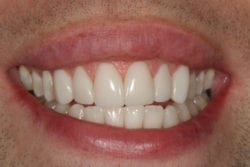
This type of dental veneer consists of tooth-colored biocompatible composite resin material. The material is similar to a dental filling and is the same material dentists use for tooth bonding. Composite resin veneers usually require little to no tooth preparation. As a patient, we can preserve more of your natural tooth enamel. However, they are less long-lasting than porcelain veneers.
Composite veneers can be an excellent temporary cosmetic solution. When a dentist places them, he or she applies the composite resin directly to the tooth. Then we sculpt the material into a natural shape.
Porcelain Veneers



A porcelain veneer is a thin shell of tooth-like material. This type of tooth veneer is highly stain-resistant and has similar light-reflecting properties to natural teeth. Dental veneers made of porcelain offer a longer-lasting cosmetic restoration of teeth visible when you smile. They require tooth preparation so they don’t look or feel bulky.
Conventional veneers have several material options. They require more tooth preparation but are much more conservative than full crown restorations. These restorations are best for cases with more significant cosmetic changes than an ultra-thin veneer allows.
Porcelain veneers are permanent dental restorations. The process involves permanently altering your teeth; we cannot undo this work. While your dentist can remove veneers if they break or wear down, you must cover them up again. This cosmetic treatment provides a natural and uniform look.
Porcelain Veneers Treatment in Philadelphia, PA
Veneers require a few visits. Before treatment, our dentist will evaluate your teeth to determine which type of veneer is right for you. We will also consider tooth discoloration, chips, cracks, and other cosmetic problems. Finally, we will provide an estimation of treatment time and cost.
Preparation
Our dentist will remove some of the tooth structure to begin veneer treatment. This preparation ensures the veneers fit tightly onto the natural teeth. Because tooth preparation is not reversible, you must be committed to treatments that cover your teeth.
Impressions
Once our dentist prepares your teeth, he or she will take an impression of them for customized veneers. A dental ceramist will handcraft your final restorations in one of our selected dental laboratories.
We will make temporary veneers for conventional veneers. They allow you to preview or try on the veneers and cover your teeth during treatment. They ensure you still have an attractive smile while the lab creates your final veneers.
Final Veneers
Your veneers will be ready in approximately 3 to 4 weeks. We will evaluate them for fit, shape, and color. Then, we precisely place your veneers. We bond them to your teeth with special resin cement. Finally, we polish them for a natural high shine.
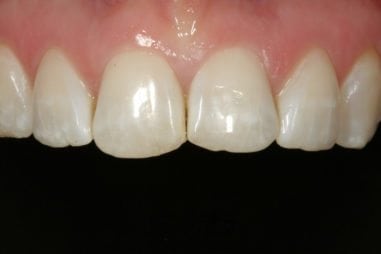
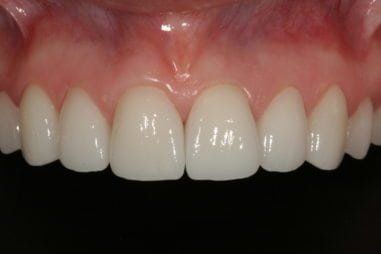
Porcelain Veneers FAQs
Do you want to know more? Read answers to these commonly asked questions about porcelain veneers in Philadelphia, PA:
How much do porcelain veneers cost?
Dental veneers can vary in price depending on these factors:
- Materials
- Number of veneers
- Complexity of your smile design
Generally, composite resin veneers are less expensive than porcelain. But porcelain often lasts longer than composite. Before treatment, we will complete a full review of the procedure, including the cost.
We will provide an estimate of the cost of your veneers before treatment. Our office also offers convenient payment options. We have interest financing through Care Credit for qualified patients for affordable veneers.
How long do porcelain veneers last?
Porcelain veneers can last 10 to 15 or more years. You can ensure they last in multiple ways.
First, you must have a good at-home oral hygiene routine. Brush and floss twice a day. Remember to floss before brushing, and floss by following the curve of your tooth. Then, brush the gums, teeth, and tongue for two minutes in circular motions.
Regular visits to the dentist will also ensure your veneers stay bright. We thoroughly remove food debris and harmful bacteria from the teeth and gums during cleanings. We will also provide a thorough examination to ensure there aren’t any infections that can impact your veneers.
Is the porcelain veneer procedure painful?
We ensure that each patient that gets veneers is comfortable and relaxed. Most patients watch movies or relaxation videos while we complete their treatment. Our goal in our office is to make your visits painless and comfortable.
We will numb your mouth before we prepare your teeth so you will not feel pain. You can experience some mild discomfort or sensitivity right after any dental procedure. But these symptoms will fade within 1 to 3 days of treatment.
Do porcelain veneers break easily?
Teeth veneers made of porcelain are extremely durable. However, they are more brittle than natural tooth enamel. Your veneers can chip or crack just like your teeth.
Don’t bite down on hard items like your fingernails, plastic packaging, or drink caps. Contact us if you begin to clench or grind your teeth at night. Teeth grinding can damage your new teeth.
What can you not do with porcelain veneers?
After treatment, avoid hard foods such as meats, raw fruits and vegetables, ice, and candy. Don’t directly bite down on hard objects or foods because this can damage or break your veneers. Don’t eat foods and drinks that may stain, like soda, ketchup, and coffee. Veneers are stain-resistant but can discolor over many years.
Do veneers make your breath smell?
Veneers should not make your breath smell bad. You likely have an oral hygiene issue if your breath smells after you get veneers. This has nothing to do with your new teeth.
You can also have bad breath if you don’t properly care for your veneers. You need to brush and floss daily. Food debris and bacteria can build up between your natural tooth and veneer. When they mix with your saliva, they create a bad smell.
For this reason, flossing your veneers may cause a bad smell. Improving your routine and visiting us for dental cleanings can lessen this smell.
Am I a good candidate for porcelain veneers?
We may recommend veneers if you want to treat chipped, stained, or slightly crooked teeth. They are a good treatment option if you are in good oral health. Before you get dental veneers, you must be free of tooth decay and gum disease. Please consult our cosmetic dentist to see if veneers are the right choice for your dental needs and goals.
Transform Your Smile
Do you want a straighter and brighter smile but don’t want teeth whitening or braces? Call Opus Dental Esthetics today at (215) 395-6076 for porcelain veneers in Philadelphia, PA. You can also schedule an appointment with us online.
Please let us know if you have questions. We’re here to help.
